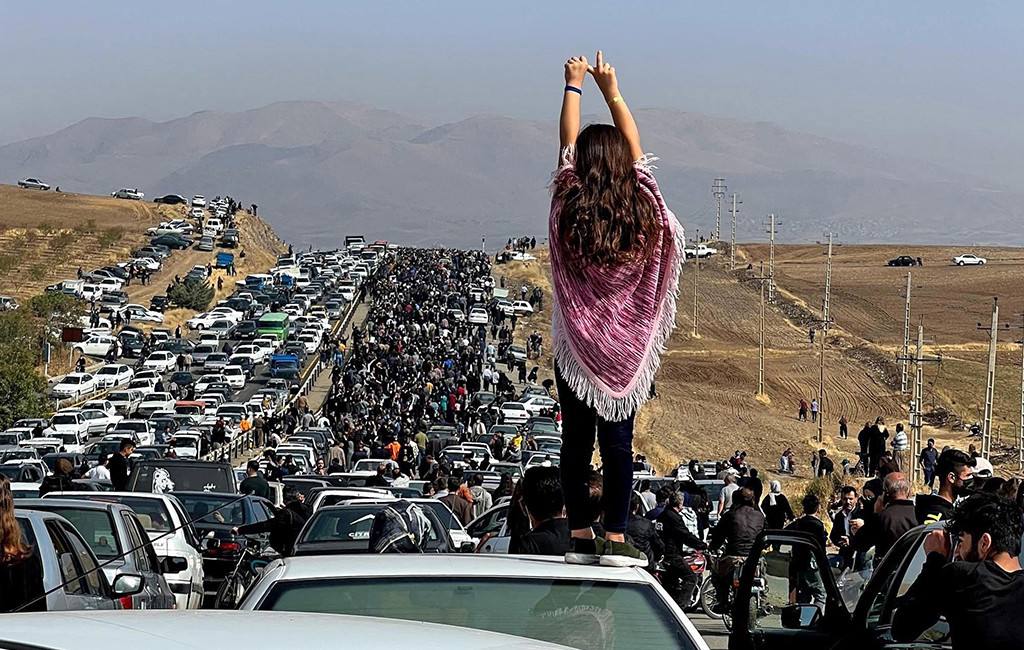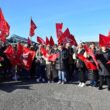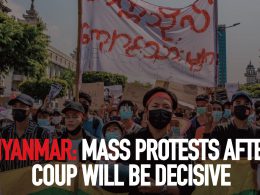This and other texts have been discussed and written together with activists on the ground and has been translated for distribution within Iran. International Socialist Alternative (ISA–the international movement we are part of) is committed to building the international solidarity movement, not only to express general solidarity and build pressure in their own countries — but to actually help to build the struggle for a socialist alternative in Iran. If you agree with our ideas and programme — help us to spread them online and directly amongst the masses in Iran and to build a revolutionary organization on the ground.
The struggle for an alternative power to the clerical regime
The revolutionary uprising in Iran has been ongoing for over 2 months now. Heroic actions on the streets, led by women and youth have been decisive in inspiring broader layers of society and the working class to rise up.
The brutal reaction of the regime has not yet stopped the masses. In fact, street protests have become larger and more radical. The various calls made by students’ and youth organizations to build organized structures are crucial for the next steps forward — this must be combined with the existing and developing working class structures that have been built in several workplaces like the Haft Tappeh Sugar factory in recent years and that are developing in these days.
The threat of death sentences for the imprisoned protesters can — despite the bravery being shown, in particular by the youth — lead to demoralization and fear amongst broader layers of the working class. In addition, the movement still lacks a clear leadership, while different forces from outside the country, such as monarchists and those backed by imperialist forces, try to portray themselves as its leaders. This is a real threat for the movement as they do not truly represent the working masses. There is the need for leadership — but one that comes from the revolutionary movement itself — fighting for the interests of the vast majority of the population, and independent from any of the imperialist powers.
This is why coordination between and the bringing together of existing student groups, regional committees, trade unionists etc. to organize a revolutionary constituent assembly is now more important than ever. This would be a step towards building real power and leadership for the movement.
Widespread market and shop closures and protests by the bazaar stall-holders, which have spread beyond the Kurdish regions, have been striking. Strikes and sit-ins by students are an inspiring continuation of resistance against all the state and security forces. And while different workers’ associations and leading workers’ activists have continually expressed their solidarity and joined the protests, strikes in different industries have not yet developed the scope, spread and duration needed to win.
At this stage, the danger of a further, even more bloody crackdown of the movement is real. We need a strategy and programme to move forward and to bring the movement onto a higher stage, in order to prevent a decisive setback. The threat of death sentences for imprisoned activists, the continuation of the conscious use of rape and gender-based violence by the security forces, the killings of young school students and children — this all shows the regime is committed to break the movement with all its power.
While the courage of the masses has not disappeared, this alone will not be enough to bring down the regime. While the regime is shaken, it will be able to cling to power so long as there is no alternative force visible that can take power and is able to expropriate the main levers of the economy from the hands of the ruling elites. Seizing economic and political power from them requires a concrete political and organizational alternative for the masses to rally around and transform their potential power into a real, alternative power.
In order to prevent the movement from dying down, such an alternative power has to be built now based on those structures that have already been spreading everywhere. In some cities, we see how police stations or administrative buildings are being set on fire or even occupied by protesters. Also, we know that the police and Basiji already have difficulties controlling their own forces, as some reports state, they have started to use Hezbollah militias to suppress the protests. In some areas, we have seen how protesters controlled small cities for several hours. These are battles taking place on a regular, night to night basis.
We see the development of structures of self-defense against the armed forces, of structures to coordinate and discuss. Doctors and hospital workers have built up an underground network for those injured by the state forces. We need to make sure that democratic structures are built, that can expand such steps and take over control over cities and regions by the working masses. Very quickly, the question of alternative power by the masses can be crucial for the movement. Their determination has already meant that regime forces had to retreat on some occasions.
Where parts of the administration and public services are breaking down, they should be run by democratic bodies of the movement. To start taking over the power locally — in cities & neighborhoods, in workplaces & schools — where the regime is forced to withdraw, democratically organized workers’ and students’ councils are the key. This is also about self-defense, which needs the building of workers’ militias and democratic, multi-ethnic self-defense committees to collectively resist state repression. Right now, we need to appeal to the rank and file of the police and security forces to join the revolutionary struggle and end the repression of the masses.
These councils could not only expand the strike movement for a general strike, they could immediately take over the local power and administration and come together on regional and nationwide level — up to a constituent assembly. They could start to disarm the repressive forces and arrest and judge the regime’s criminals, the Basiji, the Revolutionary Guards and so on, the ones who should be really put on trial.
As long as there is no such alternative power built, it will be easier for the regime to stabilize the situation — even if it’s only short-term. The call of some reformist forces to organize a new referendum on the constitution is an attempt to silence the revolutionary movement and to channel it away from the streets and workplaces. We shouldn’t reassert the theocratic constitution. In this situation, as long as the current, brutal regime is still in charge, no real democratic vote can be held anyway. A revolutionary constituent assembly elected from the masses, excluding all forces that have participated in repression, oppression and exploitation or collaborated with the regime, should democratically decide about the country’s future.
While the incredible wealth of the regime, the Revolutionary Guards and others has not been touched, and while they are continuing to profit from massive exploitation of the working class and poor, inflation and the ongoing economic crisis means further starvation and misery.
Breaking their economic power through nationwide workers’ councils that could start taking over production and the whole economy will be crucial for this struggle for full power. This is the only way to fight for the expropriation of the Revolutionary Guards, the entire capitalist class and for democratically planned production to meet the needs of the masses and environment. In fact, these councils would pose the question of power and provide an alternative. In this way, we can prevent forces hostile to the interests of the vast majority of society taking advantage of any power vacuum that develops when the regime falls. Such forces include those pseudo-alternatives either at home or abroad, who work together with imperialism, the Shah’s family and others who want to exchange one regime that is exploiting the wealth of Iran for its own purpose by another one doing the same.
Build a revolutionary party of the working masses, students, peasants and poor
This is why a socialist organization with a revolutionary programme that can propose a program and a strategy for the masses to take over power is crucial in this situation. Many, especially young people, see the necessity to organize their anger & determination. The rich revolutionary history of the country with a strong working-class movement and socialist organizations was brutally crushed by the Mullahs. Also, socialist and communist organizations that have continued to have some forces in the country are discredited in the eyes of many due to their massive mistakes in the past — mainly by handing power to the Mullahs in 1979 to get rid of the Shah instead of building an independent socialist Iran.
It is important that the left in general is trying to rebuild its forces, also on the ground, but this has to be on the basis of learning the lessons from 1979 and the past in general. We want to discuss the necessary programme for the movement now with all forces that are committed to rebuilding the socialist, working-class movement.
The immediate task is to start building a political force by students, workers, peasants, and the poor: To rally around concrete demands to end womens’, LGBTQI+ and national oppression and to make sure that these demands are placed at the centre of the revolutionary struggle. They should be linked to democratic demands like the release of all political prisoners, full rights for organized opposition groups, parties and trade unions with demands to end all forms of exploitation, for jobs, housing, workers’ rights etc. There is no struggle for any one of these issues without the other, they all have the same source which is the exploitative and oppressive capitalist system. That is why we need to fight for an ultimate break with the capitalist system in Iran and for a socialist society through an organization of working-class people and all the exploited and suppressed. It is the working class that actually has the power to take over the key industries and production out of the hands of the capitalist class to build a completely new and democratic society.
For that, the first steps need to be unification on the basis of a programme, and to decide on the necessary slogans and next steps that are needed for the movement to succeed. We want to discuss a draft for a program that has been developed and want to improve it on the basis of the experiences of activists in the different parts of Iran (link to draft). We want to discuss how to spread this programme and socialist ideas in this situation of brutal repression, and how to publish the necessary material, online and offline. To build a party that can operate, agitate and organize through the channels of communication the movement is already using to coordinate.
We do not know the short-term outcome of the movement but it’s already clear that the situation will not simply return to what existed before, and that the revolutionary process will continue. The task of building such a party is therefore crucial to struggle for a programme that actually meets the long-term needs and interests of the working class and the vast majority of the population. Such an organization — even if small in size for now — consisting of revolutionary cadres, can attract key layers of students’ and workers’ who can play a key role in moving the struggle forward and winning also broader layers of the masses for the struggle for a socialist Iran.
The International Socialist Alternative is an international revolutionary organisation. We are part of struggles of workers and the oppressed from Brazil to Russia, from India to Britain, from Nigeria to China, from the USA to Israel/Palestine, from Germany to South Africa. If you agree and are committed to build such a party — get in touch now and be part of building the forces of the International Socialist Alternative in Iran.












